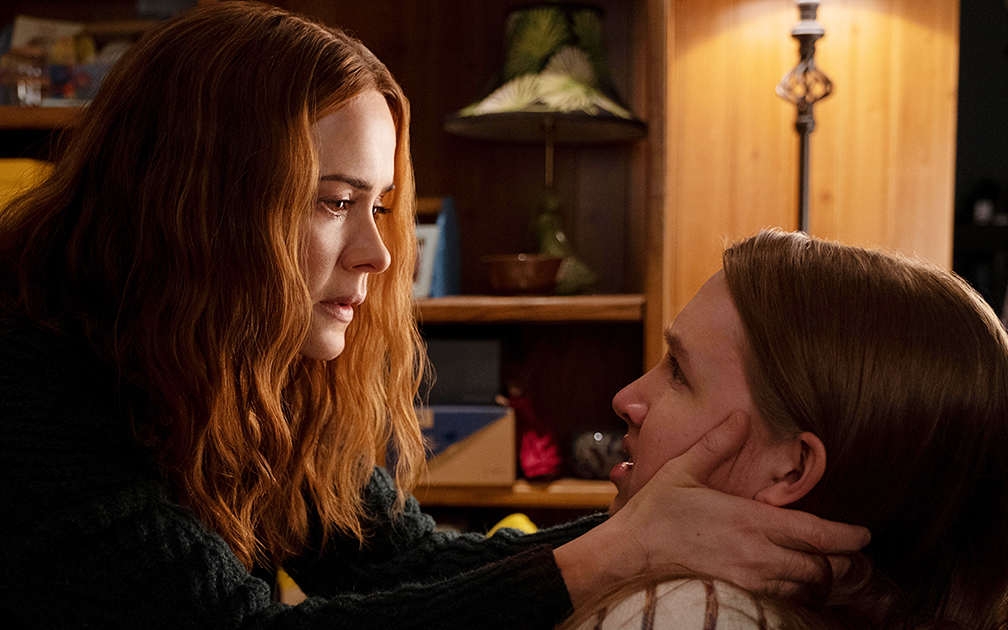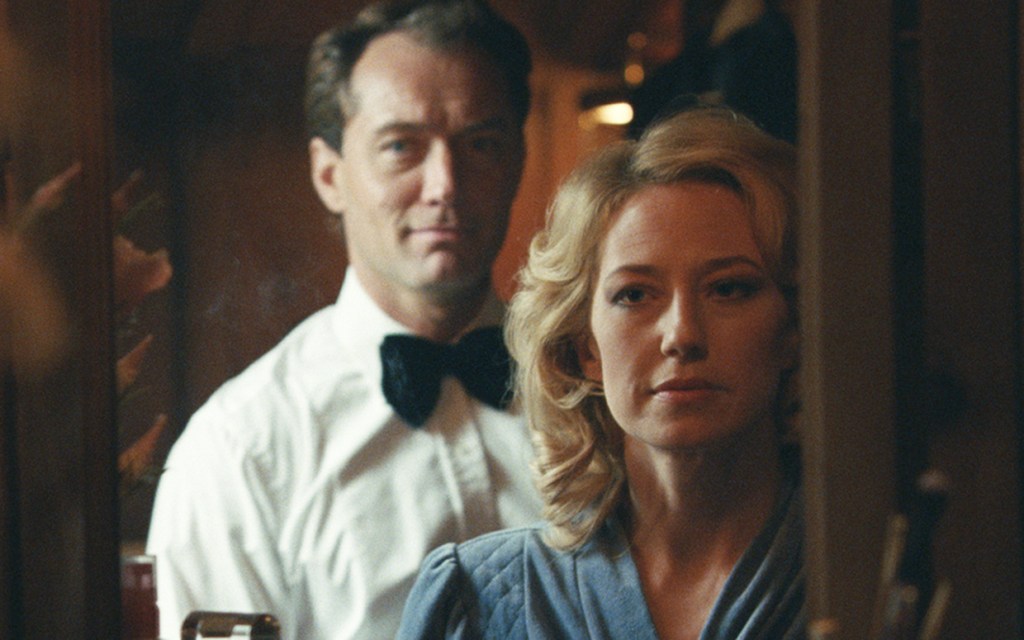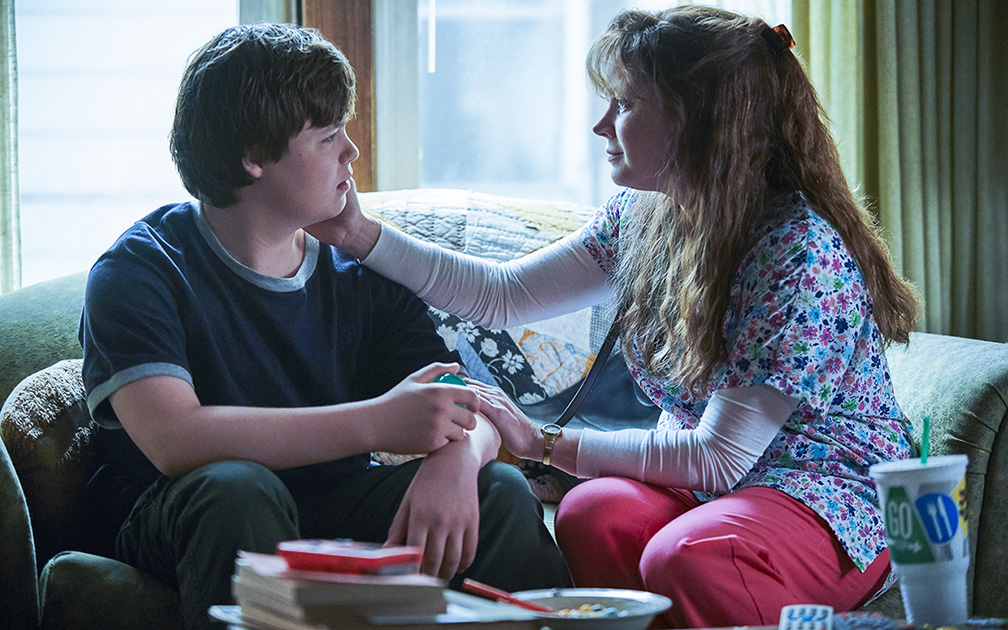Sarah Paulson is a monster mom in this wickedly inventive, twisty-turny horror thriller

Run
Starring Sarah Paulson & Kiera Allen
Directed by Aneesh Chaganty
PG-13
Nov. 20 on Hulu
Sarah Paulson has carved quite a niche for herself as a scream queen on the dark underside of nine seasons of the FX anthology franchise American Horror Story, and then, more recently, in Netflix’s Ratched, the backstory of the sadistic nurse who’d years later torment the psychiatric patients in One Flew Over the Cuckoo’s Nest.
Now she’s pitch-perfectly cast as a most malicious mother in this taut, terrifying little gem of a horror-thriller about a homeschooled teen and her helicopter mom from hell.
Run pairs Paulson with newcomer Kiera Allen as her daughter, Chloe, who figures out just how dire and dangerous things are, but then finds it hard to get away—because she’s in a wheelchair.
The movie opens with Paulson’s character, Diane, at a hospital, eyeing her newborn baby. Then it zooms ahead 17 years, introducing us to now-teenage Chloe, and her routine of daily injections, meds and inhalers to treat her asthma, diabetes, arrhythmic heart, paralyzed legs and other conditions.
Chloe’s been raised in almost total isolation by Diane, who smothers her with attention, watches her like a hawk, prepares all her meals, administers her therapy and maintains her strict homeschooling schedule.
But Diane’s been doing other things, too, secretive things, unnatural things—sinister things.
Chloe is spunky, bright and smart—and she’s waiting anxiously to hear back from Seattle’s University of Washington, where she’s applied for admission after she completes her senior coursework. Hopeful for a new chapter in her life, she perks up every day when she hears the mailman pull up in their driveway.
Diane, however, never lets Chloe check the mail—or have a computer in her room or get an iPhone. And when Chloe begins to suspect her mom has been giving her medicine that isn’t what her doctor prescribed, it worries—then later terrifies—her.
“I’ve got you,” Diane tells Chloe, burying her in a hug that gives us the creeps—and makes Chloe want to flee.

But, of course, that’s something not so easy for someone in a wheelchair.
Director Aneesh Chaganty’s only previous feature, Searching, was another modest but extremely effective thriller, about a father who breaks into his daughter’s laptop when she goes missing, desperately looking for clues in her online footprints. He’s an impressively economical filmmaker who’s all about streamlining; he knows how to make every shot, every scene, every edit and every second of screen time count. In Run, everything clicks and ticks like devilish clockwork to draw the knot of suspense and dread tighter and tighter as it goes.
Paulson is frightfully fit for the part as Diane, a mother whose “love” has clearly crossed the line from protective to possessive and poisonous. Her dark eyes are perfect for hiding an abyss of ill intentions, and there’s a disturbing, dark void behind Diane’s wan smile. There’s never any specific mention of Munchausen by proxy, a psychological disorder that involves the abuse of someone by their caregiver. But the condition has repeatedly made for a juicy pop-cultural cocktail of crime, medical mystery and genuine horror, as depicted recently on TV in HBO’s Sharp Objects and Hulu’s The Act.
As Chloe, Allen makes a powerful debut in her first feature film. She more than holds her own with Paulson, a veteran of nearly 70 TV and movie roles. The young actress—who was studying creative writing at Columbia University when she got the part—uses a wheelchair in real life, giving Chloe a calm, resourceful authenticity that makes it easy to root for her in her ever-deepening dilemma, sometimes inch by excruciating inch.
Wheelchairs are confining, by their very nature. Setting Run inside a house, for most of the film, adds to the aura of confinement, claustrophobia and challenging spatial parameters; to Chloe, looking down a narrow staircase from the second floor can like peering into a chasm of the Grand Canyon. Chaganty, who also co-wrote the original screenplay, creates a pressure-cooker atmosphere, a sense that something has to eventually bust loose, blow up—or break out.

The movie is full of edge-of-your-seat, wickedly inventive, twisty-turn, shock-ya surprises, compounded by the irony of a protagonist not being able to do what the title suggests—and the situation clearly warrants. One scene features Chloe McGyver-ing her way across a frozen rooftop with extension cords, a blanket and a screwdriver. Another involves her sneaking out of a movie theater outing with her mom to attempt a frantic, furtive trip to the local pharmacy, across the street.
Run may make you recall a couple of famous films and actors, notably Jimmy Stewart in Hitchcock’s Rear Window and James Caan in Misery. Stewart’s character witnesses and then solves a murder, all while recovering from a broken leg in his wheelchair. And Caan, as a famous novelist, escapes from the clutches of a psycho fan, turning the tables on her—also from his wheelchair. (A minor character is Run is even named “Kathy Bates,” a wink-wink nod to the actress who won an Oscar for playing Caan’s tormentor.)
Those guys didn’t let wheelchairs keep them from doing what they had to do, and neither does Chloe.
The wheelchair element makes Run even more breathless fun as a fright-night delight, but its real fear factor comes from the powerhouse female duo that duels it out in its house of horrors. Paulson is a formidable, five-star scream queen, now as a monster masquerading as a mom. But young Allen proves herself a most capable co-star—and a sensational opponent.
Jimmy Stewart and James Caan would be proud.






